An employee experience platform (EEP) is designed to enhance workplace satisfaction and productivity by streamlining HR processes. It is a central location for employee resources, collaboration, and communication.
Employee Experience Platforms are essential for organizations that want to build a better workplace culture, make better decisions, and invest in talent development. With these platforms, organizations can improve their business outcomes (e.g., bottom line and employee retention) while ensuring employees are engaged and happy.
In this article, Geekflare has tested the best employee experience software based on their key features, such as core modules, analytics, and HRIS integrations, as well as advantages and disadvantages.
- 1. Leapsome – Best for All-in-One Employee Experience Platform
- 2. Workvivo – Best for Internal Communications
- 3. Motivosity – Best for Boosting Engagement with Rewards
- 4. WorkTango – Best for Actionable Employee Insights
- 5. Culture Amp – Best for Employee Feedback and Analytics
- 6. Blink – Best for Frontline Worker Engagement
- 7. Qualtrics XM – Best for Comprehensive Experience Management
- 8. Radiyant – Best for Workplace Experience and Digital Signage
- 9. Cooleaf – Best for Peer Recognition and Rewards
- 10. Lattice – Best for Performance Management and Development
- Show less
Employee Experience Platforms Comparison
Here’s a comparison table of the top employee experience platforms based on the modules offered, integration with HR platforms, and Geekflare’s rating.
 |  |  |  |  |  |  |  |  | 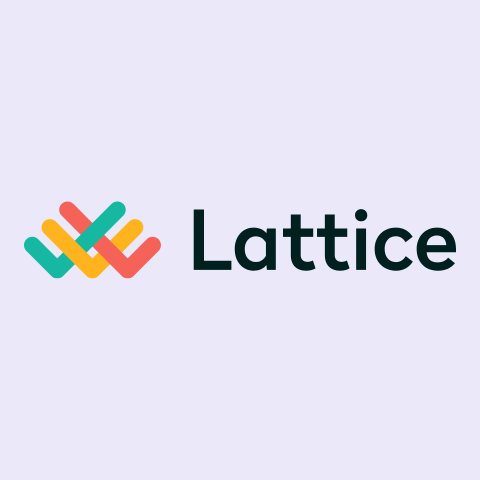 | |
Reviews, Goals, Learning | Social Feeds, Peer-to-Peer Recognition, Community Spaces, Event Management | Recognition & Rewards, Programs, Connection, Communication | Recognition, Rewards, Nominations and Awards, Incentives | Surveys, Feedback, AI-Powered Analytics | News Feed, Content Sharing, Recognition | Surveys, Feedback, Engagement | CMS, Gamification, Rewards | Recognition, Rewards, Surveys | OHR, Goals, Performance, Compensation | |
45+ | 40+ | 10+ | 40+ | 30+ | 30+ | ETX for HXM, WorkJam, ETX for RISE, Lakeside | 100+ | 6 | 10+ | |
On Request | On Request | On Request | On Request | On Request | On Request | On Request | On Request | On Request | $11/seat | |
Geekflare’s editorial team determines ratings based on factors such as key features, ease of use, pricing, and customer support to help you choose the right business software. | ||||||||||
You can trust Geekflare
At Geekflare, trust and transparency are paramount. Our team of experts, with over 185 years of combined experience in business and technology, tests and reviews software, ensuring our ratings and awards are unbiased and reliable. Learn how we test.
I will now discuss the employee experience software in detail with their features, pros and cons, and user experience.
1. Leapsome
Best for All-in-One Employee Experience Platform
Leapsome is an all-in-one employee experience platform focused on performance management, employee engagement, and OKR (Objectives and Key Results) tracking. The employee experience management software also has learning modules that improve productivity and foster career growth through continuous learning.
Below is a screenshot of LeapSome’s employee experience platform, showing a personalized dashboard with tasks, notifications, meetings, and reviews.
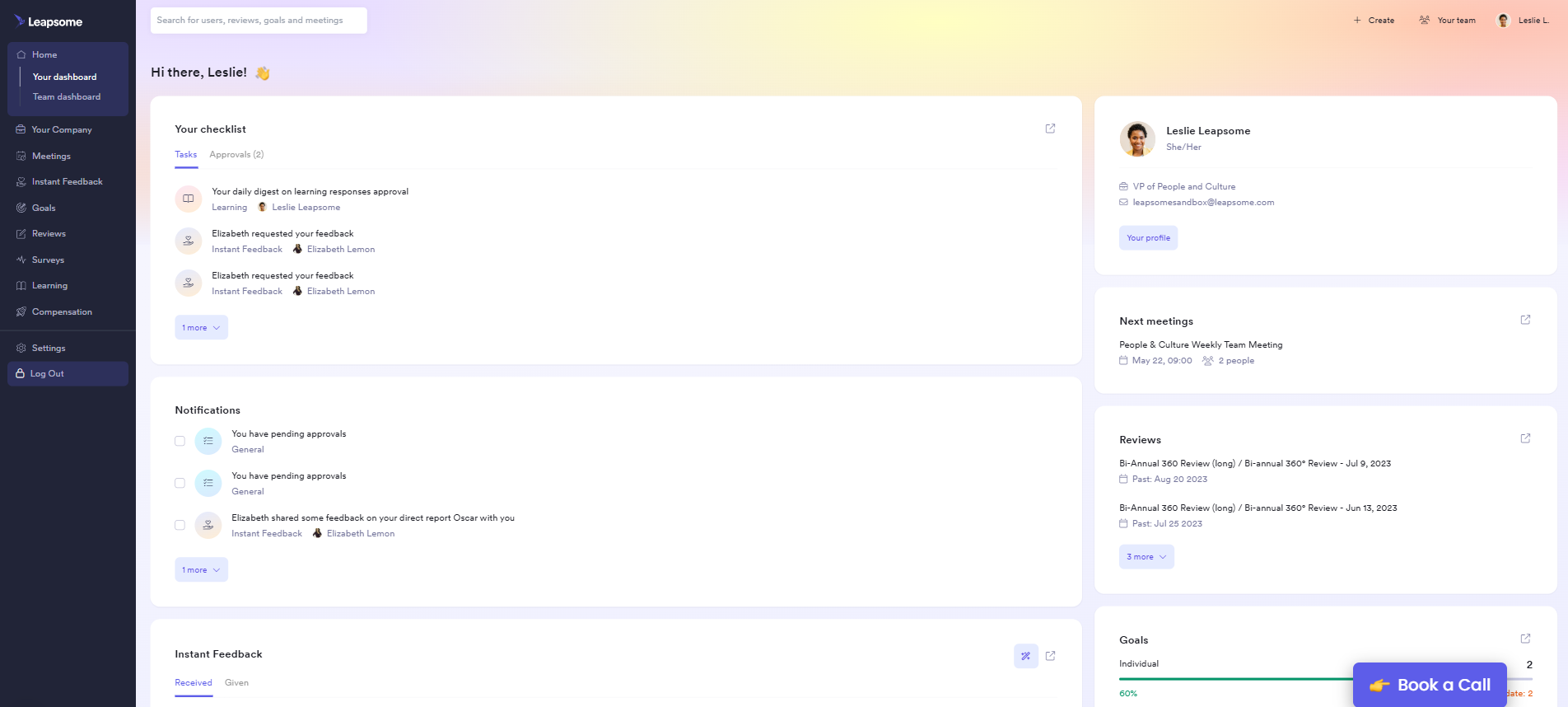
While checking the demo, I liked how easy it was to track pending tasks and approvals, give or receive instant feedback, and stay aligned on performance reviews. The layout is simple – nothing is hidden in submenus, which makes it much easier to stay on top of reviews and employee engagement activities.
Top Features
- Tools for ongoing employee feedback, performance reviews, and 360-degree assessments.
- Create and track OKRs to ensure team members are on the same page.
- Leapsome Learning upskills team members through personalized learning paths and access to resources that enhance personal growth.
- Measure performance with in-depth analytics and employee experience surveys.
- Supercharge decision-making with detailed and powerful reporting tools.
- Deep integration with dozens of HR apps, including Alexis HR, BambooHR, CharlieHR, HR Cloud, and Keka HR.
Pros
Easy to navigate and accessible user interface.
ROI calculator for calculating the benefits of investing in employees.
Offers employees growth opportunities with customizable learning.
Helps align employee goals with company objectives.
Cons
There is a learning curve when using Leapsome (despite being user-friendly).
Integrating software into the organization is a significant time investment.
2. Workvivo
Best for Internal Communications
Workvivo is an employee communication and collaboration platform that incorporates social media-like features, such as sharing updates, celebrating achievements, and commenting on posts. Its focus is on helping organizations foster a sense of community and participation.
Workvivo has more than 3 million users from more than 93 countries around the world. This includes employees from Fortune 500 companies who are using it as their social intranet. With Meta Workplace closing down in 2026, Workvivo has been named as their preferred migration partner.
Here is a screenshot of Workvivo’s Employee Insights dashboard, showing engagement scores, survey metrics, and response rates.
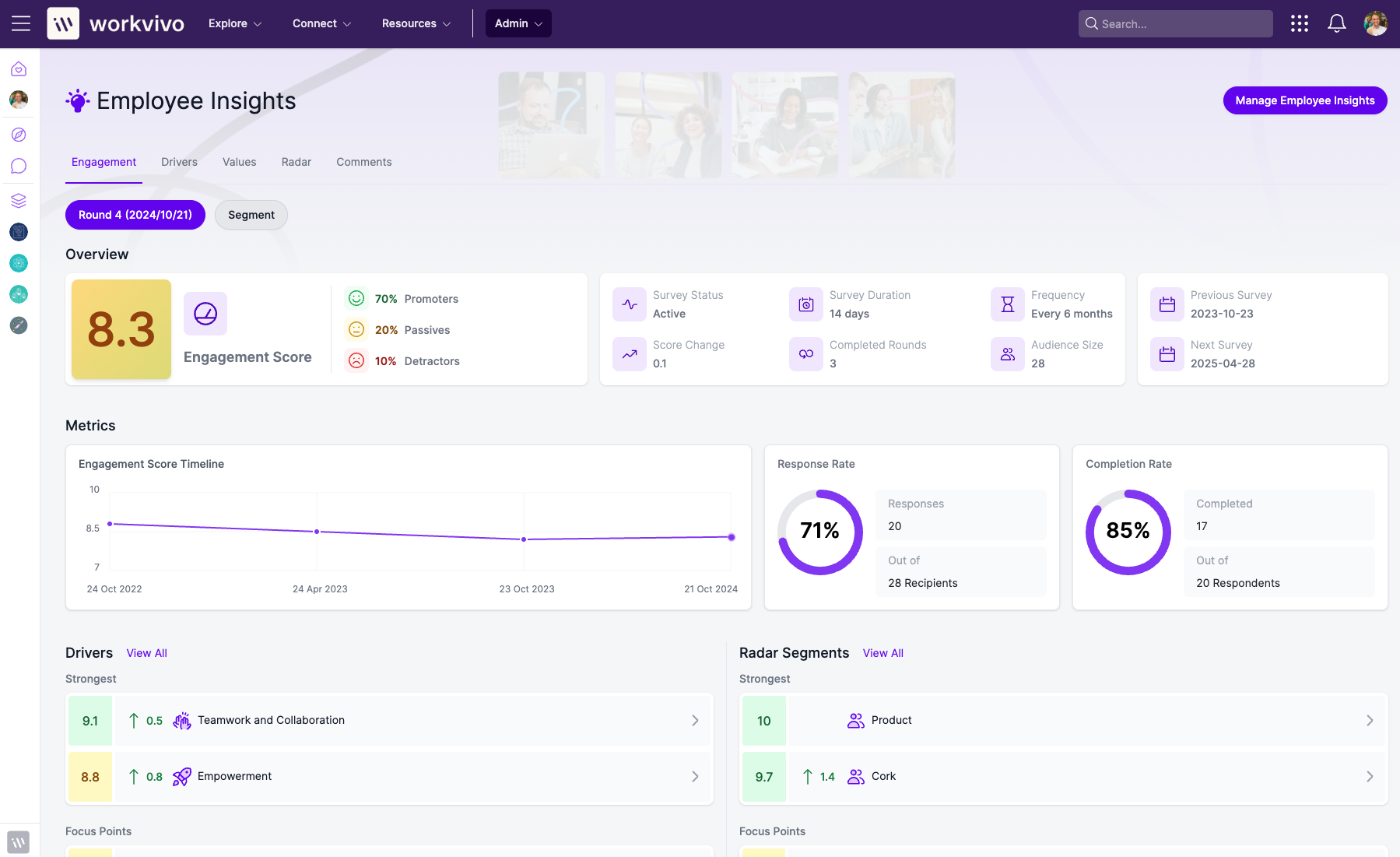
The survey analytics are broken down into engagement scores, response rates, and key drivers like collaboration and empowerment are clearly highlighted. The radar segmentation view helps pinpoint exactly where teams are thriving and where to focus improvement efforts.
Top Features
- Social feeds for company-wide updates, announcements, and information.
- Peer-to-peer recognition (e.g., public shoutouts, badges, and awards).
- AI Companion for crafting communications, creating surveys, and asking for support.
- Community spaces allow for collaboration and idea and knowledge sharing.
- Event management allows employers to create events to celebrate employee achievements.
- Live streaming feature to broadcast company announcements and updates.
- Detailed public profiles for employees.
Pros
Boost internal and organic communication.
Social media elements lead to more engagement.
All desktop features are also available on the mobile app.
Group chats foster a sense of community and belonging.
Cons
Employees can suffer from notification overload.
People who don’t use social media might find Workvivo unappealing.
Can take a while to load sometimes.
3. Motivosity
Best for Boosting Engagement with Rewards
Motivosity is a people-first recognition and rewards EEP that helps create a positive work culture by making employees feel valued and appreciated.
It has a peer-to-peer recognition program where everyone can give kudos and reward each other with points and monetary rewards. The points can be redeemed at the marketplace, which offers a variety of employee rewards, such as Amazon gift cards, prepaid VISA cards, and various customized apparel.
As shown in the below screenshot, Motivosity features appreciation posts, reward tracking, and action items, allowing employees to recognize colleagues, track rewards, and stay engaged with the company culture.
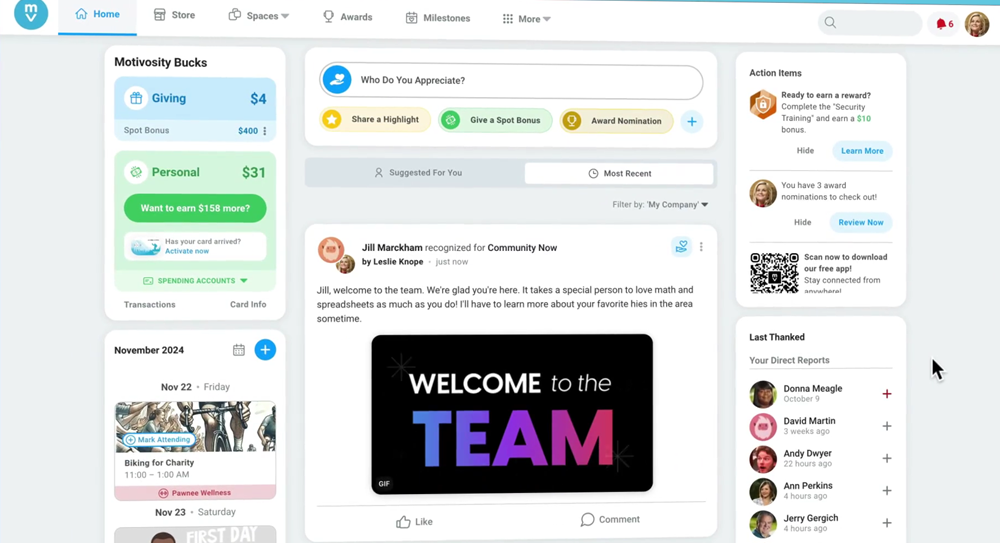
Motivosity’s social feed with peer recognition feature feels more like a celebration wall than a dashboard. You can instantly highlight someone’s contribution, give a spot bonus, or even nominate them for an award. It combines appreciation with incentives, making recognition feel both genuine and rewarding.
Top Features
- Continuous recognition to keep employees engaged, productive, and happy.
- Employees can create a culture of appreciation with a peer-to-peer recognition system.
- Social media-like features for employees to interact and celebrate each other.
- Reports and analytics focused on gathering insights on employee engagement levels and recognition patterns.
- Generative AI provides helpful suggestions that lead to effective decision-making.
- Employee space for creating, hosting, and scheduling important internal communications.
- Pulse and employee engagement surveys to gather employee sentiments.
Pros
A variety of customizable rewards for employees.
Generative AI makes training managers more affordable.
Has social networking features (e.g., social feeds, profiles, and company blog).
Seamless integration with several HRIS apps (e.g., ExponentHR, Google Sheets, Zenefits, and Paychex).
Cons
Employees can abuse the peer-to-peer point system.
A limited number of HRIS integrations.
Reports are good but basic.
4. WorkTango
Best for Actionable Employee Insights
WorkTango is an employee management platform that uses features like real-time feedback and AI-powered analytics to collect employee experience data. The anonymous feedback helps ensure that employees are providing accurate and truthful responses.
WorkTango is designed to help managers increase employee retention and ensure satisfaction. It is used by over 1,000 organizations that put their people first.
WorkTango’s Recognition Activity dashboard shown below gives a real-time snapshot of how many points are available, who’s sending or receiving recognitions, and which types (like high-fives or comments) are trending over time. I liked how filters for department, manager, and location let us dig into specific segments. It is very helpful for spotting engagement gaps or overperformers.
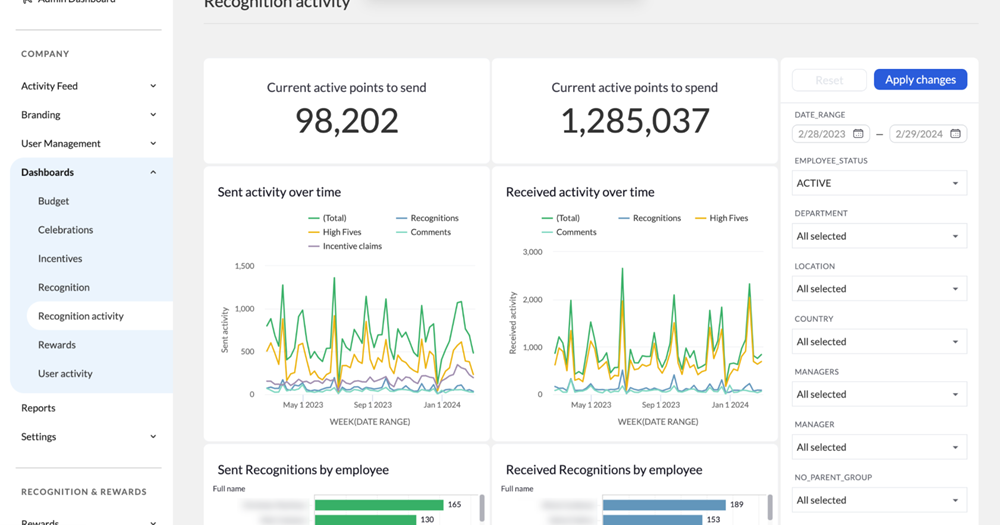
Top Features
- Real-time analytics and in-depth reports for performance tracking.
- Customizable surveys for the employee journey and engagement.
- Automate the rewards and recognition process to instill brand loyalty.
- Rewards marketplace allows employees to redeem rewards points for travel, hotels, and events.
- Integration with over 40 HRISs, including BambooHR, Workday, Microsoft Teams, Slack, and ADP Workforce Now.
- AI-powered recommended actions, employee insights, and sentiment analysis.
- Leadership tools for employee management, recognition, and feedback gathering.
- Provides tools to help run a wellness program for the physical, mental, and financial benefits of employees.
Pros
Easily gather real-time feedback from employees.
Provides tools to easily recognize and reward employees.
AI can summarize employee feedback and make recommendations.
Manager-specific reports to help address team issues.
Customizable surveys to gather needed data from employees.
Cons
Reports are basic and need more customization options.
It can take a long time for employees to gather enough points to redeem them for rewards.
5. Culture Amp
Best for Employee Feedback and Analytics
Culture Amp is an EEP that can help gather feedback from employees using survey templates designed by scientists. There are a variety of them aimed at garnering feedback throughout the employee life cycle, whether it is onboarding, engagement, pulse, performance, inclusion, or offboarding surveys.
Culture Amp helps managers understand the feedback through AI-powered insights, enabling them to make data-driven decisions. These decisions, in turn, will create a positive employee experience and culture in the organization.
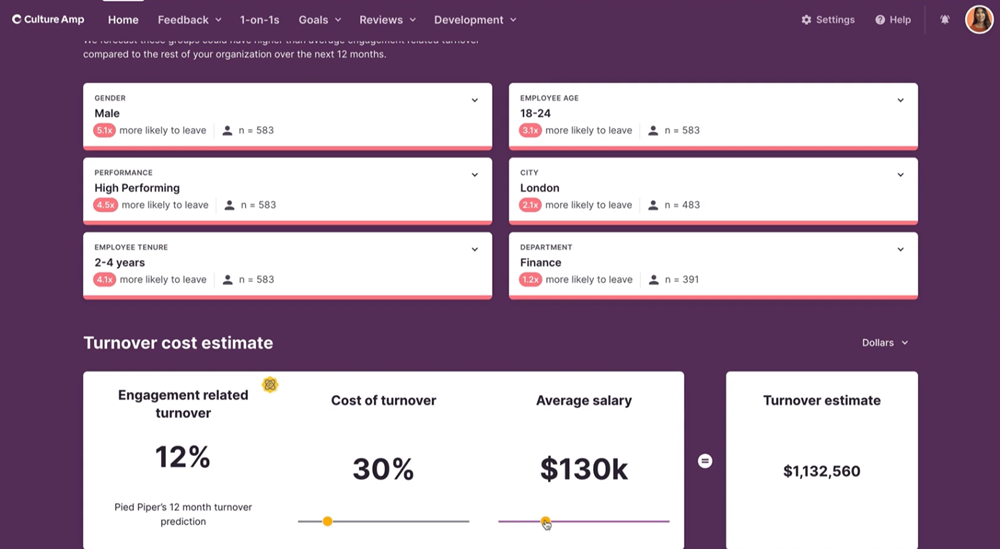
Above is a screenshot of Culture Amp’s dashboard. It shows turnover risk analytics, showing which employee groups are more likely to leave based on factors like gender, performance, tenure, age, location, and department. The turnover cost calculator is a very useful feature that lets you enter salary and cost assumptions to instantly see how much attrition is going to hurt the business.
Top Features
- Over 40 science-backed and customizable survey templates.
- AI-generated actionable insights streamline analyzing survey responses.
- Analyze open-ended survey responses using the Text Analytics feature.
- Generate visual and interactive dashboards and reports.
- Connects to existing HRIS tools in the organization’s workflow, including payroll systems, benefits management platforms, and more.
Pros
Provides proven action plans from leading organizations worldwide based on results.
Helps benchmark results to identify trends and best practices.
Known for its intuitive and user-friendly interface.
Strong user community and customer support.
Cons
Not suitable for small businesses with a limited budget.
No mobile app.
Over-reliance on surveys can lead to survey fatigue.
6. Blink
Best for Frontline Worker Engagement
Blink is a workforce management platform designed to improve the communication and engagement of frontline workers. This includes employees in industries such as retail, healthcare, hospitality, tourism, manufacturing, and construction.
It focuses on providing them with the necessary tools to message team members, receive updates, access schedules, and more through a mobile-first approach. This ensures that people who are out in the field are engaged with the organization whenever they need to.
Blink makes it incredibly easy to post announcements or team updates right from the home dashboard, which feels more like a social feed than a corporate tool. I liked the engagement score feature on the side that gives a quick pulse check on how many people are actually reading and reacting to the updates.
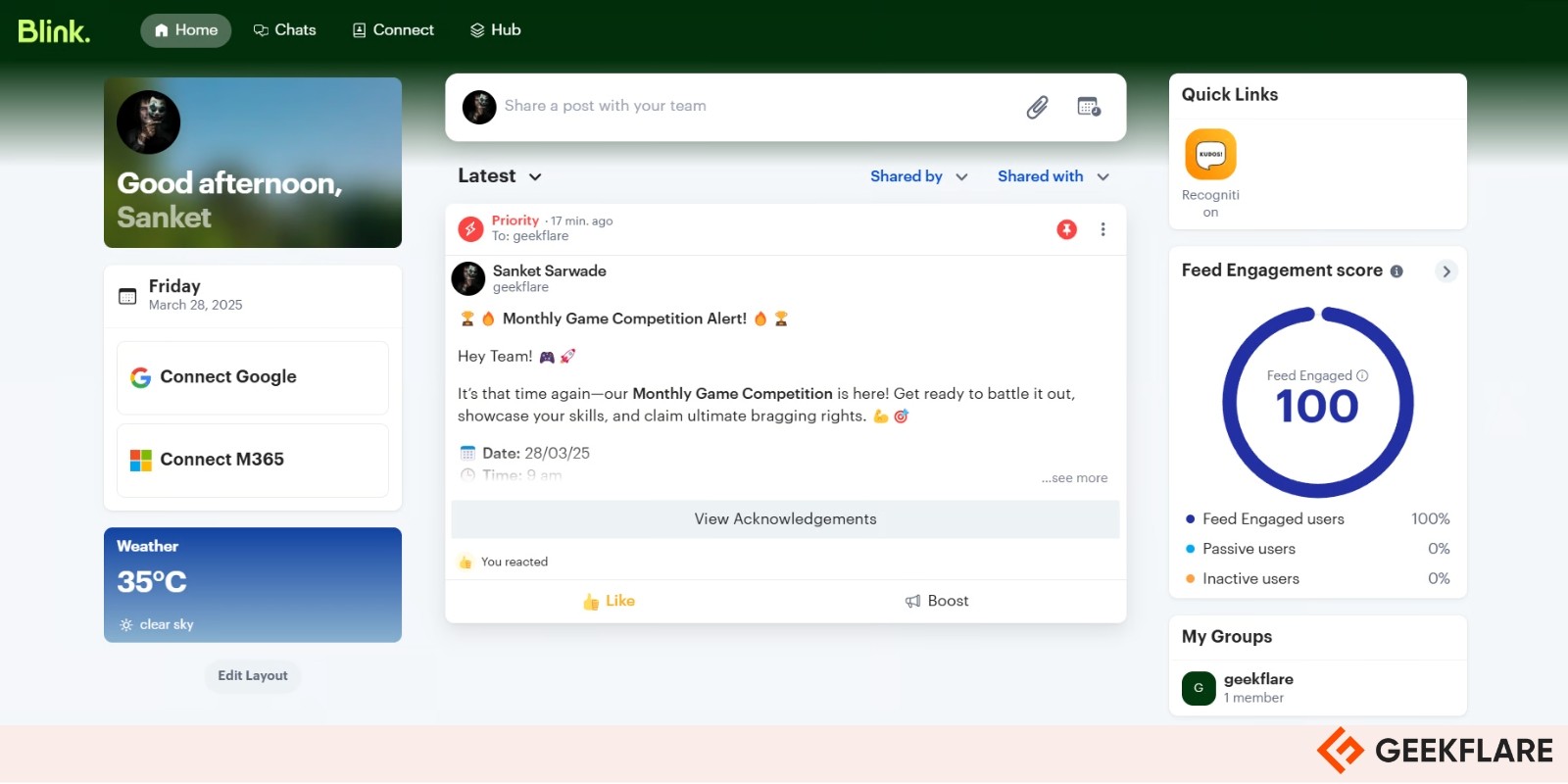
You can drag and drop widgets, tweak layouts, and even highlight tasks for the whole company in one go. It’s also super handy that you can add links to tools like PowerBI, Workday, and BambooHR, making it a true command center for daily work.
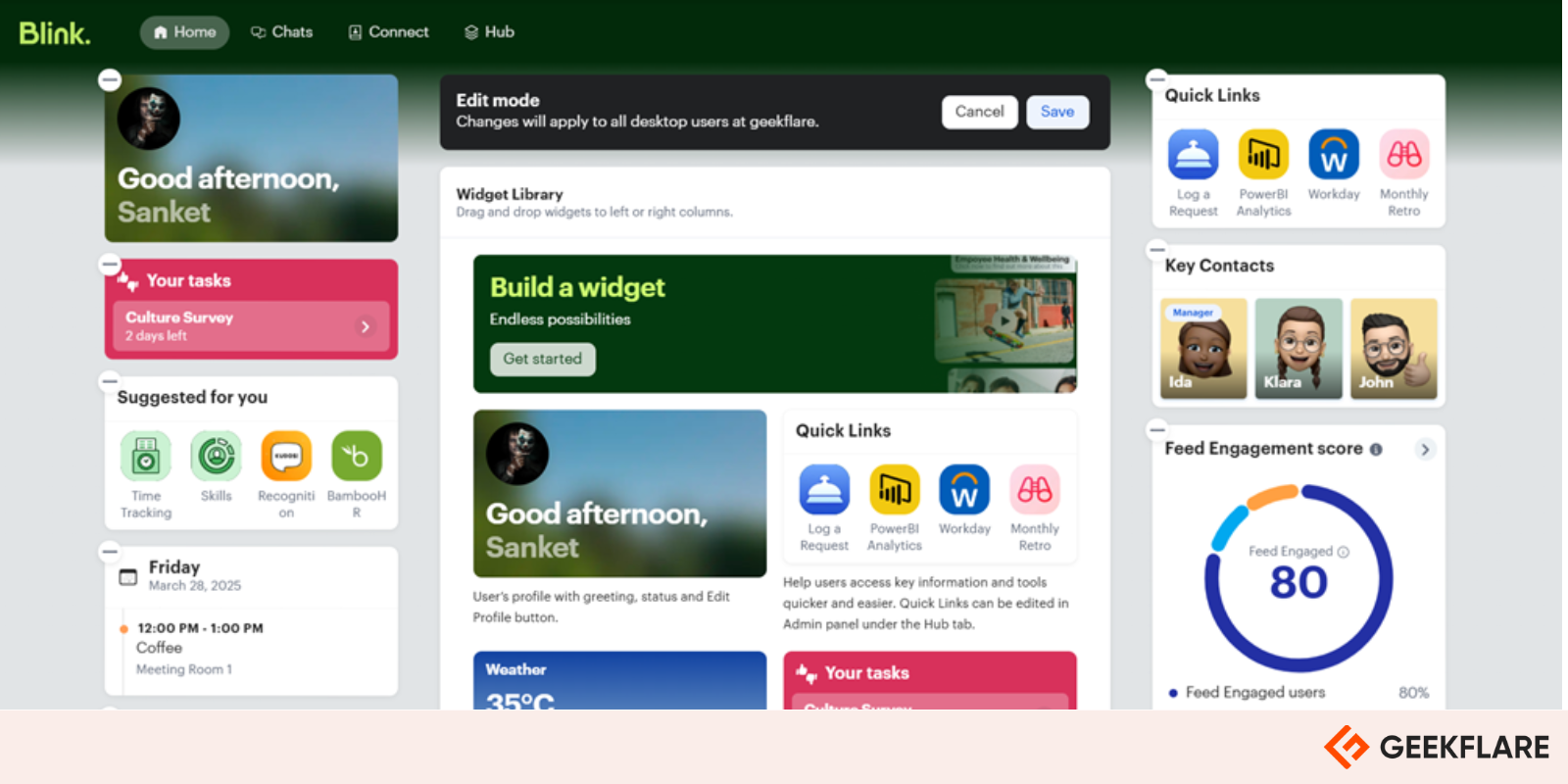
Top Features
- The employee app provides easy access to Blink’s communication channels, engagement tools, and productivity features.
- The live feed provides updates and announcements to everyone in the organization.
- The Content Hub offers a central location for important resources and information.
- The Kudos system makes employees feel valued.
- The Blink Assist AI helps create and improve communication.
- Integrations help bring an organization’s existing HRIS tools into Blink.
- Create surveys from scratch or by choosing from a list of pre-selected questions.
Pros
The mobile-first approach is suitable for non-desk workers.
Real-time updates ensure everyone is always on the same page.
Employees can create private rooms and groups for secure chats.
The mobile app has offline access.
Provides analytics on employee engagement and communication.
Cons
Requires constant access to mobile devices in the field.
Constant notifications from the mobile app can lead to information overload.
Some users have complained that Blink has limited customization options.
7. Qualtrics XM
Best for Comprehensive Experience Management
Qualtrics XM is a powerful solution that helps organizations improve employee outcomes. With Qualtrics XM, managers can identify key factors that can improve engagement, performance, and retention. Thanks to its AI, which combs through heaps of data in seconds and provides actionable insights throughout the employee lifecycle.
Qualtrics XM, founded in 2002, is based in Utah, USA. It has been in the industry for two decades. Its experience management platform is used by over 18,000 businesses worldwide to drive business growth and return on investment.
The first thing I noticed when trying out Qualtrics XM demo was how it surfaces the big employee experience metrics like engagement, wellbeing, inclusion, etc, in a clean, digestible format. Each metric links to deeper insights, so managers can immediately explore what’s driving the numbers and where to act.
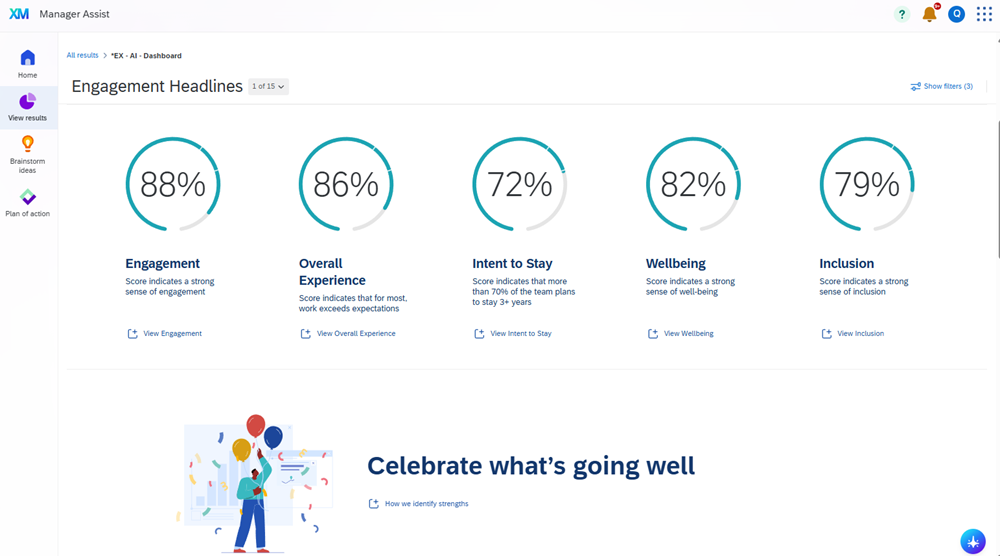
The Action Plan Report dashboard makes follow-up feel less like a checkbox exercise and more like real accountability. You get a clear view of how many plans are in progress, completed, or falling behind, plus you can filter it by department or topic to learn where more focus is needed.
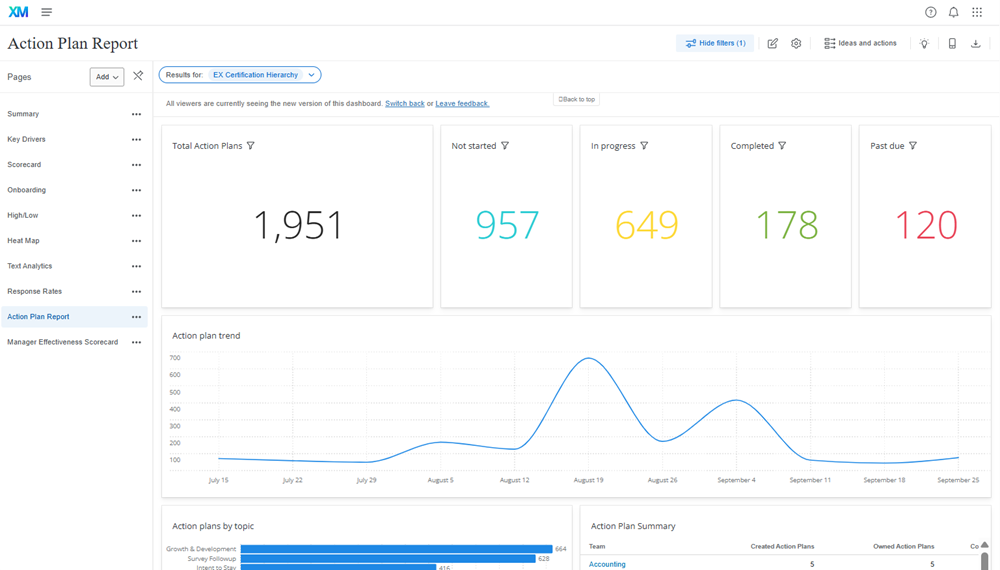
Top Features
- Surveys for every stage of the employee life cycle, from onboarding to offboarding.
- Provides tools for 360-degree feedback, automated performance reviews, and personalized reports.
- AI-powered insights to identify key drivers of employee engagement and satisfaction.
- Provides predictive analysis to identify employees who might quit, as well as guided recommendations to reduce turnover rates.
- Integrates with several third-party apps to enhance the organization’s efficiency.
- SSO (Single Sign-On) for easy and secure access to the platform.
Pros
Delivers robust and accurate people analytics.
Multi-language surveys and dashboards.
Comprehensive dashboards and reports.
Can compare engagement scores against industry benchmarks.
Mobile app for Android and iOS.
Cons
Some people find the user interface to be complex.
Requires an internet connection at all times.
Some users say the reports and dashboards can be slow to load.
8. Radiyant
Best for Workplace Experience and Digital Signage
Raydiant is a digital signage and customer and employee experience platform that focuses on creating, managing, and scheduling content for digital displays. It is used by over 4,500 brick-and-mortar businesses, such as restaurants, hospitals, airports, hotels, retail stores, and stadiums.
Raydiant can be used in the workplace to create engaging content for digital displays in various office locations. These include workstations and desks, break rooms, boardrooms, cafeterias, lobbies, receptions, hallways, and common areas.
The display shows announcements, leaderboards, motivational quotes, event calendars, dashboards, safety guidelines, recognition programs, and even cafeteria menus.
This requires the use of a proprietary plug-and-play device known as the ScreenRay. When plugged into a display, it connects to the Internet and pulls content from the cloud in real-time.
Top Features
- Easily update content in one dashboard and display it in thousands of locations.
- AI-analyzed insights based on employee interactions (these can help inform the content strategy).
- Thousands of customizable templates for creating engaging content.
- Content playlists help organize and schedule relevant content seamlessly.
- Create and manage tasks using the employee experience app.
Pros
Contains a fully-featured, cloud-based CMS.
Improves workplace experience and engagement through digital signage.
Can use the mobile app to create and schedule content from anywhere.
24/7 customer support.
Cons
Requires the use of proprietary hardware (ScreenRay).
Software and hardware costs can be expensive.
9. Cooleaf
Best for Peer Recognition and Rewards
Cooleaf is an employee experience and engagement platform for delivering recognition programs that boost employee morale and productivity and instill brand loyalty. It uses a peer feedback system, where employees can recognize each other and celebrate achievements.
Organizations can easily fine-tune their recognition system using real-time and AI-powered insights from surveys. This data can be used to reward the best performing employees.
There are various reward options, including gift cards from dozens of stores, marketplaces, and service providers (e.g., eBay, Amazon, Apple, Xbox, Doordash, Hulu, American Airlines, and Airbnb) and various merchandise.
This makes the recognition feel meaningful and can be a motivating factor for employees moving forward.
Top Features
- Streamline and automate the recognition process.
- Employees can recognize each other in real-time, fostering a culture of appreciation.
- Track and measure the impact of the recognition systems with analytics and reports.
- Customizable rewards allow management to create unique experiences for employees.
- Peers can nominate each other for specific rewards and recognitions (managers approve the nominations).
- Integrates with existing tools in an organization’s tech stack.
Pros
The flexible rewards system allows employees to choose meaningful prizes.
Multi-language support for global teams.
Peers can participate in recognition programs from anywhere using the mobile app.
Automation ensures no recognition slips through the cracks.
Managers have oversight, ensuring everything is fair and deserved.
Cons
Over-reliance on automation can make everything feel impersonal.
Running a meaningful recognition and rewards program can be time-consuming.
Waiting for manager approvals can cause bottlenecks in the recognition process.
10. Lattice
Best for Performance Management and Development
Lattice is a people management platform offering tools for performance reviews, goal-setting, and continuous feedback. It enables employers to foster a culture of ongoing improvement within their organizations and create personalized career growth plans for their most valued employees.
Lattice has over 5,000 customers, creating a positive work environment. These include companies like Webflow, Monzo, Green State, and Linktree. It suits businesses of all sizes, from startups to large enterprises.
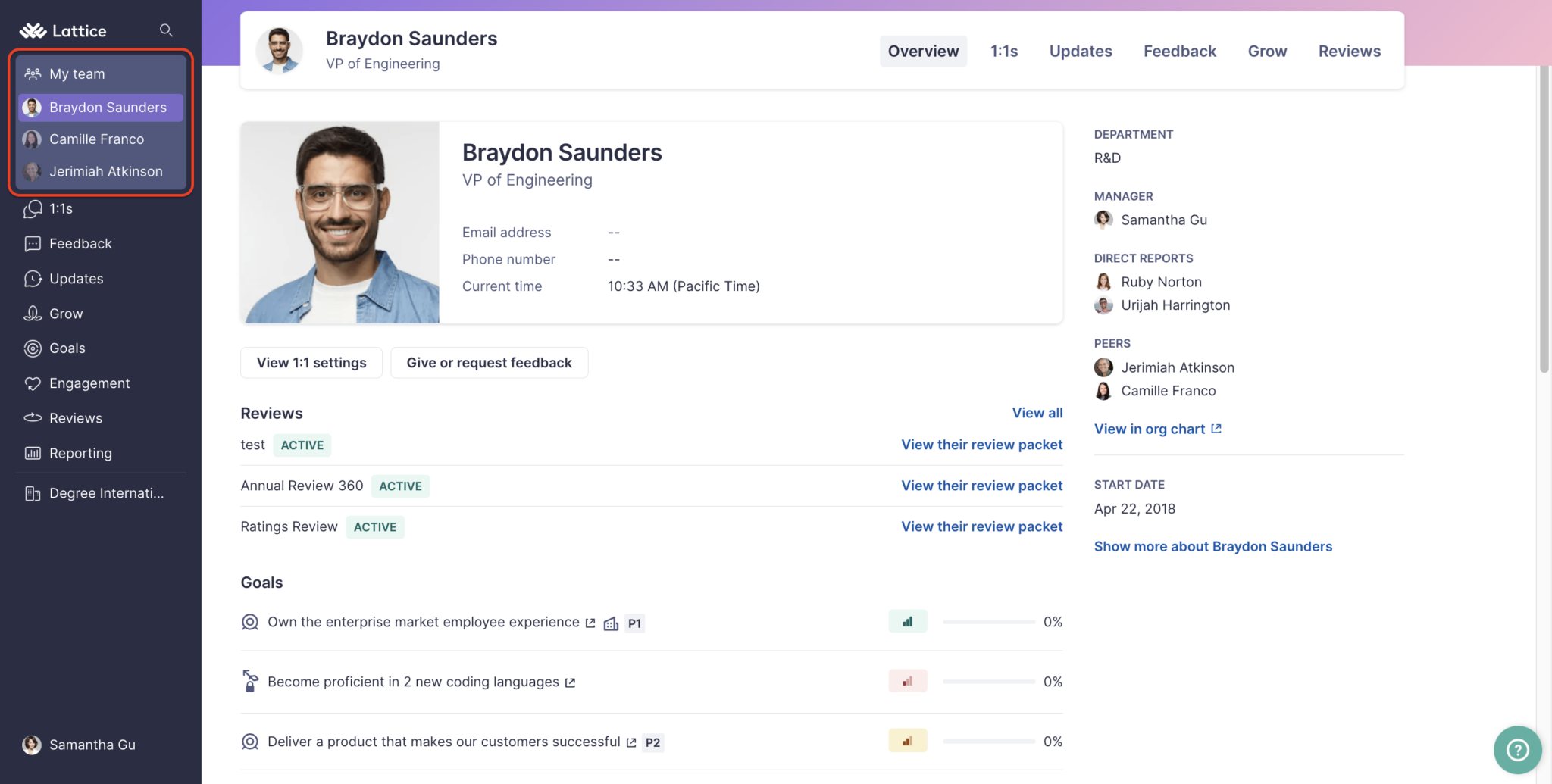
Above is a screenshot of Lattice, showing an employee profile with reviews, goals, manager details, and peer relationships. This setup helps improve the employee experience by providing clear performance insights, goal tracking, and structured feedback, fostering growth, engagement, and career development.
Top Features
- Performance reviews help identify the best-performing employees through customizable review cycles (quarterly, annually, or on a per-project basis).
- Helps conduct talent reviews to uncover growth opportunities and areas of improvement.
- 1:1s help strengthen relations between managers and employees and create a goal-setting culture.
- Updates help employees remain focused, identify progress blockers, and ask management for help.
- Align team members with organizational objectives through trackable goals and OKRs.
- Integrates with Zenefits, Workday, UKG, Namely, and several other HRISs.
Pros
Get insights from surveys in minutes with AI.
Anonymous 360-degree reviews.
Data-driven insights for informed decisions.
Focus on employee development and progress.
Cons
Users report that performance can be sluggish and glitchy at times.
Lack of payroll features.
Other notable Employee Experience Platforms
In addition to the above, these platforms also aid in improving employee experience and deserve honorable mentions.
- Thrive Sparrow – AI-powered solution with real-time feedback
- Achievers – Offers integration with leading HRIS tools and an open API
- 15five – Uses Machine Learning to analyze employee surveys and suggest areas of improvement
- BambooHR – Suitable for companies already using BambooHR software’s HR module
- Microsoft Viva – Best for companies already using the Microsoft 365 suite
- Workleap – Integrates with all the heading HR platforms
What are the Main Benefits of an Employee Experience Platform?
Employee experience platforms offer the below 5 benefits that can make the workplace a better place for everyone.
- Enhance workplace culture: Through continuous real-time feedback, recognition and appreciation systems, and open communication, EEPs can make employees feel valued and supported. As organizations continue to learn about their employees, they can take preemptive actions to improve employee recognition, engagement, satisfaction, retention, and well-being.
- Boost employee productivity: EEPs communication and access to support and resources more streamlined, allowing employees to focus on their core responsibilities. By providing clear self-service options and identifying the service channels for issue resolution, EEPs can significantly boost the overall productivity of employees.
- Improve decision-making: These platforms often include detailed analytical tools, such as dashboards, reports, and benchmarks. These allow organizations to track and understand key employee experience metrics and extract actionable insights. More modern tools have also added AI, which offers predictive analytics, engagement analysis, performance tracking, and employee sentiment analysis.
- Streamline HR processes: EEPs reduce the manual labor involved in repetitive administrative tasks, such as onboarding, feedback collection, performance reviews, and offboarding. They also eliminate the error-prone nature of manual processes.
- Foster continuous learning and development: An employee experience platform can provide managers and employees access to high-quality training resources, courses, and personalized upskilling opportunities. It also allows employers to track progress and learning outcomes, ensuring they align with the organization’s needs and cementing brand loyalty.
How to Choose an Employee Experience Platform?
When choosing an employee experience platform, consider the following key factors:
- User-friendliness: The best digital employee experience tools should have an intuitive interface that allows employees and managers to easily navigate without extensive training.
- Customization: A good platform allows the organization to tailor it to fit their specific needs.
- Integration Capabilities: The EEP should integrate seamlessly with the HR tools the organization already uses.
- Analytics and Reporting: Robust reports and analytics are essential to good EEPs because they allow managers to measure employee engagement, performance, and satisfaction.
- Feedback Mechanisms: The EEP should have mechanisms allowing continuous, real-time feedback.
- Learning and Development: Look for platforms that support the continuous development of employees.
- Security: Ensure the platform has the strictest security standards and measures to protect employees’ personal and financial information.
What Is the Difference Between Employee Experience and Employee Engagement Platform?
Employee experience platforms are designed to improve the entire lifecycle of employees at a company. They have a broad approach encompassing various HR functions, including recruitment, onboarding, development, and offboarding.
On the other hand, an employee engagement platform is software that helps management make decisions that improve workplace engagement. Employee engagement software identifies and analyzes key drivers, including job satisfaction and recognition programs.
Frequently Asked Questions (FAQs)
A people experience platform is a tool that helps organizations understand and improve the experience of all stakeholders, including customers, employees, partners, directors, creditors, suppliers, and investors.
The four pillars of employee experience are work culture, technology and tools, work environment, and employee well-being.
Explore more on HR Tools
-
 EditorUsha, the editor-in-chief of Geekflare, is a tech-savvy and experienced marketer with a Master’s degree in Computer Applications. She has over a decade of experience in the tech industry, starting as a software engineer and then moving into digital marketing and team management.
EditorUsha, the editor-in-chief of Geekflare, is a tech-savvy and experienced marketer with a Master’s degree in Computer Applications. She has over a decade of experience in the tech industry, starting as a software engineer and then moving into digital marketing and team management.


